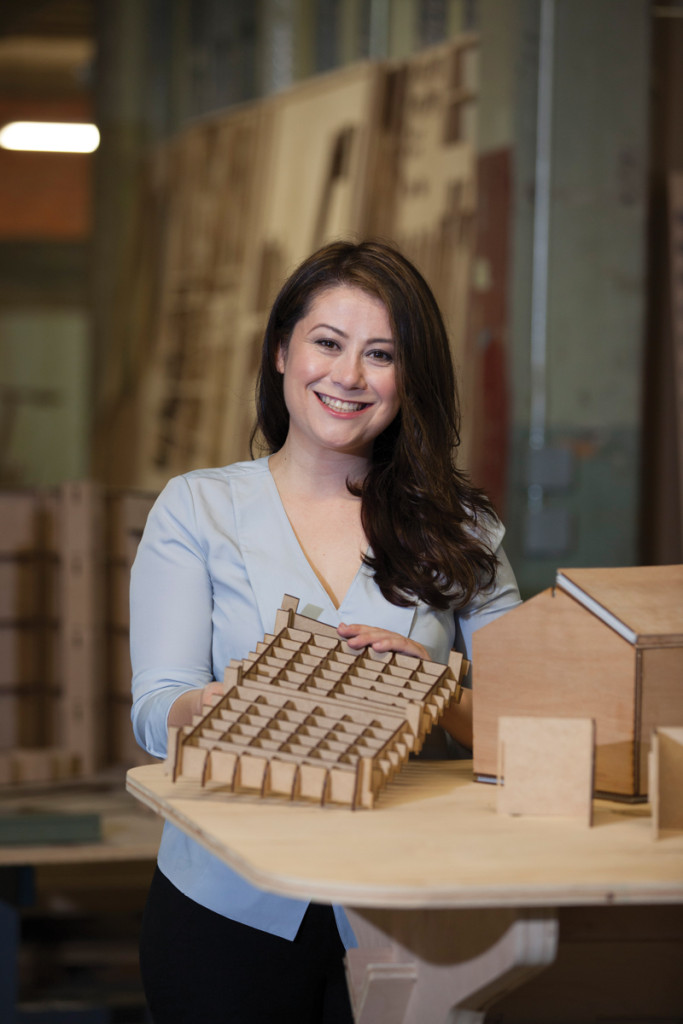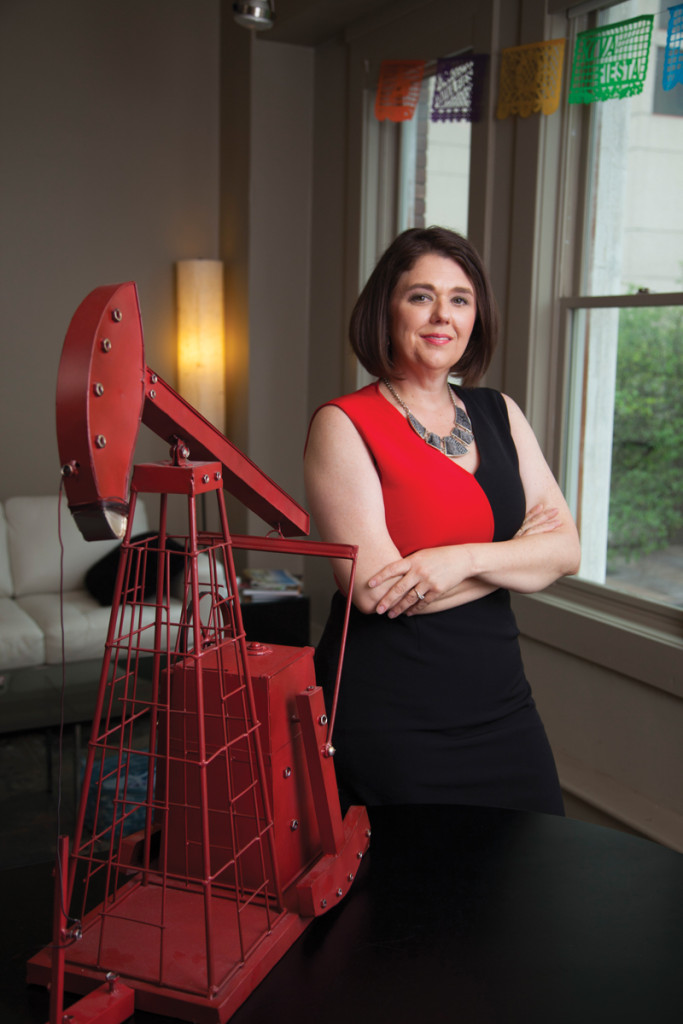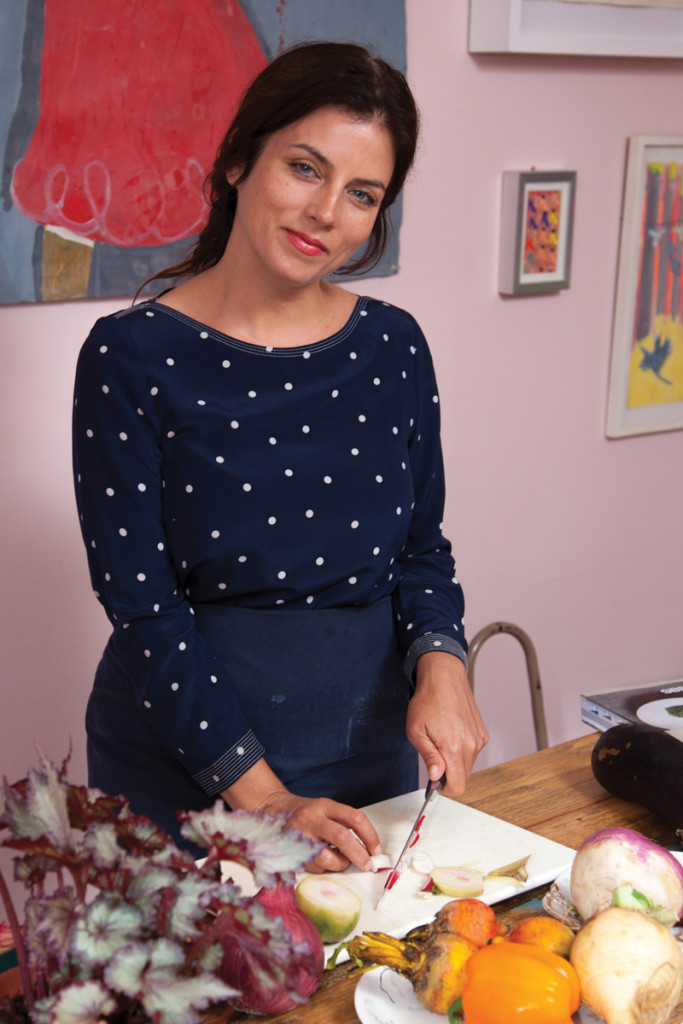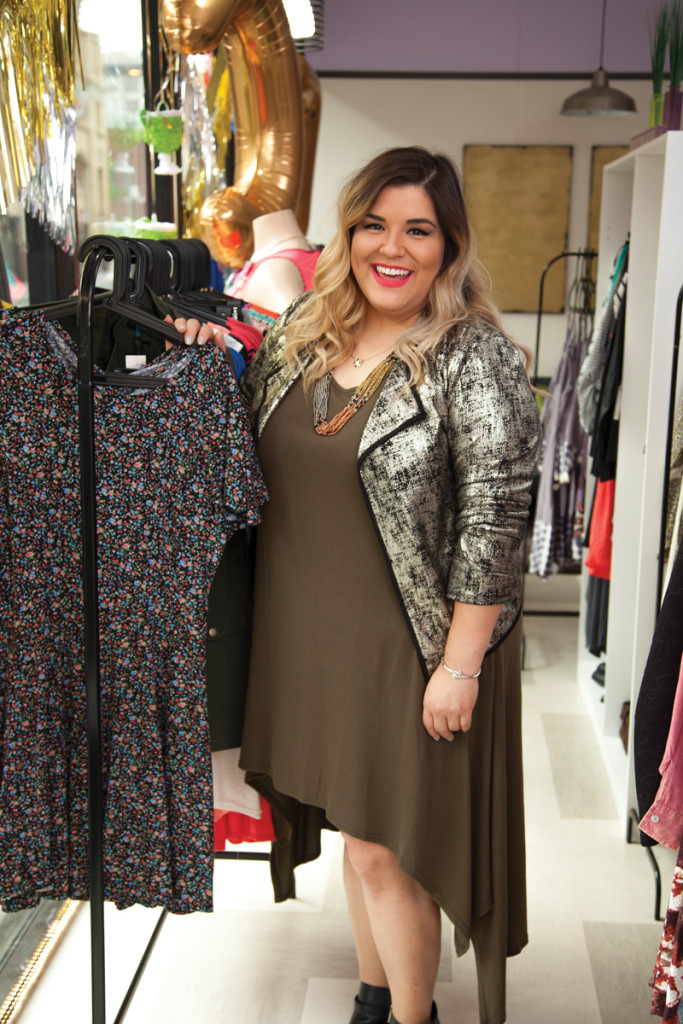The four extraordinary women featured in this article are forward-looking entrepreneurs who embrace risk and welcome new challenges. They have faced failures and rejections and have used those experiences to create new opportunities. They range from a high-tech startup mogul looking to change the residential landscape in San Antonio to a young retail entrepreneur redefining our concept of beauty, one woman at a time. All of these women are change agents and powerful leaders. All are determined to carve out a path for themselves and for the greater San Antonio community. They dare to be different, to be pioneers and to traverse new ground. And they are more than willing to take all of us along with them.
Pegy Brimhall
Unlocking Land
“Never doubt that a small group of thoughtful, committed citizens can change the world. Indeed, it is the only thing that ever has.”
— Margaret Mead
Frank Lloyd Wright, whose mid-century prairie style homes were among the first to advocate for streamlined, uncluttered living, once said, “The architect must be a prophet… a prophet in the true sense of the term… if he can’t see at least 10 years ahead, don’t call him an architect.” Pegy Brimhall of Rising Barn, a San Antonio-based startup dedicated to creating DIY, prefabricated homes that are both functional and beautiful, is just such a prophet. Her vision for living space extends beyond the physical structures themselves. She and her partners aim to redefine how we construct space, live in it and connect space within our communities. Their big idea is to re-imagine custom home building as something that combines prefabricated homes and DIY custom home building with small space living and thus change the residential landscape in San Antonio.
Brimhall has an architecture degree from the University of Texas and an MBA in finance from Cornell. After graduating from UT, she and a friend moved to New York City with $3,000 from her father and a list of UT alumni she thought might help her get a job. She found a sofa she could stay on for free, courtesy of an engineering alumnus who lived on the Lower East Side. Brimhall says, “We had S3,000 and five bags of dumplings from Chinatown to live on.” She spent six weeks knocking on every door of every lead and came away with a job. Soon she knew she would not be content to stay in her workaday job in New York and applied to Cornell, eager to get her MBA in finance and to move on to bigger and better things. She recalls, “I was thinking, I’ll work for a real estate developer who has global projects.” The market was at a low point at the time, and so when she graduated, she got what she called “courtesy job offers” from Cornell alumni who offered her half pay to just sit and wait until the market came back. Brimhall, who had never been one to sit around, started thinking about what was next.
She knew early on that she was bound to do something bigger and bolder. “Wanting to win is definitely in my DNA,” says Brimhall. Wanting to win, as she put it, led her to the startup culture taking root across the country in the mid-2000s. Her first foray into startups was in the fashion industry. She had learned that operations costs in fashion were so high that lots of regional markets had trouble maintaining office space. She proposed a digital trade platform that allowed merchandisers to trade from their home offices and gain a fee off of transactions. This freed designers and buyers from having to deal with rent, gasoline and the costs of infrastructure.
Though she got seed money to pursue the idea, the deal fell through. Brimhall was devastated. She recalls, “I thought everything was going to be so fantastic, that the universe was aligning, and then it all came crashing down. I was heartbroken.”
Brimhall moved to San Antonio to lick her wounds in the company of family and friends. Her parents had retired here, and she had a sister with whom she was very close. San Antonio seemed like a good place to heal, but also a good place to start anew. “San Antonio was supposed to be a temporary thing, a three-month thing. But even though I thought it would be temporary, I was also well aware of the potential here. I knew what a strong economy San Antonio had, and I also knew that for a person with my skill set, there would be many opportunities for reinvention in this city,” she says.
She started to learn about the market needs in San Antonio and returned to her roots in architecture and finance. “I started working on a construction method that focused on panel systems. You put it up a wall at a time,” she says.
A year and a half after devising her original concept, Brimhall graduated from Texas Venture Labs. She was convinced that small structures were what people here needed. In 2015, she found a creative partnership with Bret Elmendorf and Peter French. “The three of us had drastically different life trajectories. Bret came from the tech world at Rackspace. Peter is a real estate developer and former president of Café Commerce who knows about real estate policy and regulation.” The creative triangle focused on developing a semi-industrial, automated approach to housing: “to build thousands and ultimately tens of thousands of houses at a price that people can afford.”
Rising Barn, at its core, is really a hybrid of tech and real estate in the best sense. “The yield we can provide on investors’ money is comparable to what a tech company can provide. But because we are a real estate company, with products that are real and physical, we mitigate against risk,” explains Brimhall. Their idea, which focuses on prefabricated homes, exquisite materials and small, do-it-yourself structures, brings the cost of design down to nothing. The software that Rising Barn has developed automates the production of building materials and puts the power of constructing a home in the hands of the homeowner.
“Our goal is to make it easy for you to build your house as you want it,” says Brimhall. “You can apply the precut flooring and put up the panels. We can reduce construction time by more than 50 percent. In addition, we use materials that are semi-assembled in a factory. It is a clean environment, protected from things like rain and hailstorms. Therefore our building materials can be precise and accurate.”
The larger goals of Rising Barn are focused on the social good. In addition to advocating for a simpler way of living, Rising Barn also asks us to imagine how other people are living. From that, the more important questions emerge about what we as a society can do about making sure that all of us have a space in which to live. “We are going to mobilize to create teams of builders in neighborhoods that can bring the cost of building down so that people who have heretofore been unable to afford homes can move in and become a part of a neighborhood,” says Brimhall.
She is very clear about how Rising Barn will achieve its lofty goals. As with traditional custom homebuilding models, buyers will secure a site or tract of land, and then select the type of home they want to build. That’s where the traditional piece of the puzzle ends. Rising Barn’s floor plans range between 200 and 800 square feet. It offers turnkey developments whose price point includes the cost of material and labor and also an option for the DIY customer. Its homebuilding kits significantly reduce building costs. In either case, the price points are more manageable and the construction efforts much less complicated and pricey than in traditional custom homebuilding.
Brimhall and her partners are committed to San Antonio, to the resurgence of downtown residential and to being real live change agents who might help us see the residential landscape a bit differently. We cannot wait to see what’s on the horizon.
The Energy CFO Solution
“Do one thing every day that scares you.”
—Eleanor Roosevelt
Paula Waggoner-Aguilar‘s biography is as impressive as they come. A senior finance and accounting executive with more than 15 years’ experience working for Fortune 100 and 500 companies in the energy industry, Waggoner-Aguilar exudes the competence of someone who has earned her place atop the corporate ladder. She confesses that before she left the world of the big corporation to venture out on her own, she asked herself, “Am I happy? Am I thriving?” When the answers to those questions were “no,” she was more than willing to give up the corner office to try something new. It is this formula of forging her own path that has served her well her whole life.
Raised by a family of entrepreneurs, Waggoner-Aguilar was the oldest girl in her family. During the summe, her mother sent her to work on her grandfather’s ranch in the Panhandle. At the age of 14, she worked for her uncle, who owned a commercial real estate business. He had a female CFO who took Paula under her wing, and got her interested in finance. This was the first of many mentors Waggoner-Aguilar had who nurtured her talents. As an undergraduate at UT Arlington, she thought she would major in music but eventually decided on something she considered more pragmatic and switched her major to accounting. She then pursued her master’s in accounting at the University of North Texas.
Never content with the linear path, Waggoner-Aguilar was looking to do something different after graduation. She wanted to work in Latin America. Her mother had taught English in Mexico in the 1960s, and Waggoner-Aguilar decided to enter an executive program in Mexico City to help hone her business Spanish. This was in the early ‘90s, and the North American Free Trade Agreement (NAFTA), which was still in its infancy, seemed to offer many opportunities for a young accountant who had fluency in Spanish. She returned from Mexico City to work at Ernst and Young for a year in tax compliance, but working in Latin America was still a dream of hers.
She started banging on doors and asking for positions that would get her to Latin America. “I was rejected over 100 times,” she says. The rejections were painful, Waggoner-Aguilar admits, as she reflects on it. “Sometimes I still start crying.” But, she says, “Scars are a great source of inspiration.” She used those scars and those rejections to push herself forward: “Those scars taught me a lesson about believing in myself and about not giving up.”
After a series of rejections, she finally got two bites. She was retrained as an auditor for Halliburton and traveled 11 months out of the year to Latin American countries, including Mexico, Venezuela, Colombia and Peru. She continued to climb the corporate ladder and worked on mergers and acquisitions and in technical accounting for Duke Energy in Latin America. In 2006, BHP Billiton recruited her to help build an integrated gas business. When the company changed leadership, they asked her to learn the offshore petroleum business. She had a strong financial mind, but her bosses wanted to see how she would do in the commercial side, working with a negotiating team. “I had mixed emotions,” Waggoner-Aguilar says, but she did it. A year later, BHP moved her into the planning group. She was the first planner appointed without an engineering degree. She attributes that role to exposing her to a range of operational and resource planning aspects and to new business models.
“Chaos is my friend,” Waggoner-Aguilar says with a smile. “When a new opportunity arises, there is fear. There is the chance of failure, but there are also opportunities to change and to grow.” This attitude is one she held onto as she decided, in 2010, to venture out on her own.
Waggoner-Aguilar had gotten to a point where she says she was fortunate to have a wonderful career, but she knew she wasn’t really happy. She liked startups, liked helping them grow from their nascent stages or interceding during a period of strife. “I like the early life cycle of business and going in and cleaning up a business that is facing challenges.” Knowing that she wanted to do something different, she started talking to private companies. “It didn’t go well,” she says. Finally she found a business owner in Houston with his own unique CFO shop. She asked him to teach her how to be a consultant. She helped him build his energy practice, and he helped her market her skills to private companies and learn how to go out on her own. She worked for him for a year before being recruited to San Antonio by a private energy company. She worked for that company for 13 months before she transitioned to running her own business.
She noticed there was a gap in financial leadership in private companies. And she felt pulled to help private firms because of her own family background. “Family-owned businesses and private businesses are rare. I enjoy seeing how we can help them get the right type of financial leadership,” she says.
In April of 2013, Waggoner-Aguilar started her own company. Her goal was to establish a niche firm that provided consulting, interim and fractional financial leadership to private energy and technology companies. She spent the first six to eight months meeting people and building institutional knowledge.
“When I first started making the transition, people kept asking me, ‘why are you doing this?’” They had a hard time understanding her willingness to give up the comfort of the predictable for the challenge of something new. Waggoner-Aguilar smiles as she notes, “My business is celebrating its third-year anniversary!” Once again, she has forged her own path successfully.
Waggoner-Aguilar is particularly interested in supporting female entrepreneurs in the energy and technology sectors. Three years ago, she helped found the South Texas chapter of the Women’s Energy Network, which helps women get the support they need to pull them forward and to help them recognize and seize opportunities.
She has this advice for women: “The one thing that holds women back is confidence. It isn’t skills or education. It is confidence and the fear of failure.” She advises those who might follow in her footsteps to embrace the failure: “Failing is the easy part. The hard part is hanging in there day after day, every day.”
That’s exactly what she is doing.
Tim the Girl — A Multi-Disciplinary Culinary Company
“If you obey all the rules, you miss all the fun.”
— Katharine Hepburn
Tim McDiarmid’s culinary business is a multifaceted, expansive enterprise that takes on the audacious challenge of getting her clientele to rethink everything they think they know about food and food culture. This audacious concept of thinking about food as a relational, interactive, performative and aesthetic experience is the brainchild of a bright, introspective woman who has never, ever been content to lead the cookie-cutter sort of life.
Born on the western coast of Canada in an alternative community of draft dodgers and hippies, she knew she was never going be part of the mainstream. “I grew up in a dome!” she confesses. “All of the culinary trends that are happening now, including locally sourced food and pulling from your own garden, were sort of normal to me,” says McDiarmid, whose childhood on a farm, with parents who had chosen to move away from a comfortable, suburban lifestyle, informed her ideas about food and life. “My mom grew our food. We lived a good solid 45 minutes away from any sort of big grocery store. This was a lifestyle choice, so much so that we even had no indoor plumbing for a while,” she recalls.
To counter that “off the grid” home life, McDiarmid attended a mainstream small town public school. There her counterculture upbringing came to the fore and began to inform her identity politics. Her clothes were different, her ideas about the world were different, and even her lunches were different. While the other kids had standard Americana sandwiches made of processed lunch meats and cheeses, she says, “I had bee pollen and lentils.” Though she embraced her against-the-grain sort of life, she was restless by nature, and her goal after high school was “to get away as quickly as possible.” She said that although she was a typical antsy teenager, the seedlings of the startup magnate she has become were taking root in high school. “I was one of the underground leaders. I wasn’t the prom queen. But I was a leader,” she recalls.
She matriculated at the University of Victoria and earned a degree in creative writing, Plagued by a restlessness that would be both her burden and her engine for the remainder of her young life, she was looking for adventure wherever she could find it: “I thought I might be a journalist in a war-torn country. I thought that might keep my mind occupied enough that I wouldn’t go crazy.”
In 1993 she moved to New York, which allowed her to experience a world totally different from her small town childhood. She worked in fancy restaurants, took a break to help a friend run an organic farm and then came back to New York to find inspiration in and around the artistic scene there. Her friends were all craftsmen, artists, artisans and entrepreneurs. Everyone collaborated on expansive, dreamy projects that allowed her to grease her creative wheels and hone her leadership abilities. She did some interior decorating work and saw the value in deep, connected collaborations with others who shared her creative spirit and innovative mind.
McDiarmid moved to San Antonio in 2010. By that time she had a child and a marriage that was in the process of dissolution. The realities of life had forced her to be more pragmatic, and she was looking for new challenges. “I hadn’t written a résumé in my life, and I was 39 years old. The first time I tried to write one, I ended up writing a résumé for someone else, someone I didn’t know. It certainly wasn’t me,” she says.
Finally she started asking herself the kinds of difficult, soul-searching questions that would lead her to invent a unique culinary space in San Antonio, this new town she had adopted. She started asking herself, “Who do I want to be?” “Where do I want to eat here in San Antonio?” and “What do I want to feed my kid?” It sounds cliché, she notes, but necessity truly is the mother of invention. “I had a young kid. I was a single mother. I was working out of my house and trying to start a business.”
The business started as a catering company that would defy all of the tacit rules of catering. She wouldn’t have servers in dark pants and white shirts. She wouldn’t have clients choose between fish and fowl. Instead, she would create a unique artistic culinary experience for her clients that focused on every detail, from the eating space to the design of the plate on which the food was served. Each plate would be handcrafted and made to order. And here’s the clincher: It would all be a surprise. The client wouldn’t necessarily have a huge hand in the menu. McDiarmid thought of her work the way a true visual artist does. A great artist doesn’t produce a work of art to match your sofa, and great food shouldn’t be churned out in a homogenous, cookie-cutter way, either. This was not only a big concept, one she’d have to teach to her clients and her community, but it was a hard one to execute on her own. She remembers, “I was so weak and vulnerable. It was a pivotal moment. You have to trust yourself and look at your experiences. Hone your ideas a little bit to where they make sense.”
McDiarmid focused on what she loved: family-style eating, inclusivity, beautiful, unpretentious foods.. She created surprise pop-up restaurants all around the city. She had conceptual parties for groups of people where she’d teach her customers what it meant to eat in a way that was big and bold and far from the mainstream. It was a huge risk, but people started gravitating toward her ideas, and, most importantly, toward her food. She would feature a different artist for each party. She never told her guests what they were eating or even where they were going. The whole thing was a big, beautiful, unpredictable and slightly chaotic adventure. It was a genius idea that took off immediately. Her tickets became the hottest ones in town.
Finally she moved away from pop-ups. She had been doing them every six weeks. They were expensive, and the pace was grueling. She had to think of another innovative way to bring her culinary concepts to a bigger audience. She had proven herself in San Antonio, but it was time to take an even bigger risk.
Three years ago, in 2012, McDiarmid hired a sous chef. Next came an assistant. She realized that if she was truly going to make a go of her business, she needed help. Now she has expanded from catering, to food delivery services, to cooking classes, to event planning and to consulting. Her business sees it as a mission to “help others realize their food-related dreams.”
Her next concept is a brick-and-mortar “grab and go” shop with prepackaged foods for food-conscientious consumers. She is excited about the future. “I fully believe in this new concept. The market is there,” she says. She recognizes that in moving ahead with a brick-and-mortar shop, she throws off her own self-imposed shackles — ones that have guided her through her whole life: “Stay restless, don’t commit, go where the wind blows you.” But she knows it is time to plant her flag. She says, “I really know what I want, and I guess I am going to have to go get it.”
ELSA FERNANDEZ
“Capturing Eyes at Every Size”
“Be a first-rate version of yourself instead of a second-rate version of someone else.” — Judy Garland
Elsa Fernandez knows a couple of key things about San Antonio women: “They are willing to take risks, and they aren’t afraid of a little color.” Fernandez is thrilled with this knowledge because taking risks and showing your true colors is exactly what she has in mind for her clients at her new plus-size fashion boutique for women. Fernandez’s Eye Candy Boutique, located in the Houston Street Garage’s first floor at 531 Navarro St., is an oasis for women looking to add flair and style to their wardrobe, to find just the right outfit for a special occasion or to consult with Elsa, who knows that true beauty comes from the inside out. Her job is help her customers find the beauty within themselves.
Fernandez herself is the best advertisement for her business. She is a fashion-forward 32-year-old drop-dead-gorgeous business pro with an infectious smile and a passion for her work. For her, it is all about making her customers feel good about themselves. She is a one-woman operation. She chooses all of the great fabrics, innovative looks and fun accessories for the 700-square-foot shop she now calls her own.
Born and raised in San Antonio, Fernandez spent her formative years centered around her mother, whom she describes as “the strongest woman I know. For a long time, it was just me and my mom,” Elsa recalls. Her mom constantly told her, “Anything is possible if you put your mind to it.”
Fernandez attended Incarnate Word High School and graduated from Texas State University with a bachelor’s in fashion merchandising and from the University of North Texas with a master’s in merchandising. She started at Forever 21 as a visual merchandiser and credits the company with being a valuable training ground. “I learned so much because I was able to put what I was learning in my courses about consumer behavior into real life practice,” she says.
After almost 10 years of retail experience as a store manager and a visual merchandising manager, she was ready to open her own business. She saw a need for the kind of store she runs today—a place where women who have trouble finding clothing in mainstream department stores can come and find real fashion.
Fernandez is a risk taker as much as any other business leader you’ll meet, but as a child she was always very risk averse. “I always played by the rules and tried to be an easy, carefree child,” she recalls. Now, as an entrepreneur, she knows that the recipe for success depends upon a willingness to be brave.
The biggest risk Fernandez took was to leave her job at Forever 21 and go out on her own. But she thought about it this way: “If I am going to be working so hard for someone else, I can be working twice as hard for myself.” In 2014 she dedicated three months to writing her business plan. She went to her adviser at Texas State, who said it was one of the best business plans she had ever read. Fernandez remembers, “ I walked out of that meeting with a feeling of such contentment because I knew my business plan had legs.” Eager to get going, she set up meetings in Austin and in San Antonio, but nobody would give her a loan. “I remember distinctly I had a meeting on a Monday with a gentleman in San Antonio, and he said he was dreading the meeting all week. He said he knew I could do well, but he just couldn’t give me the money.”
Fernandez recalls, “I sat in my car for an hour and realized that I had invested six months of my life, and so much of my savings. I was in too deep to go back to a retail job. I had to keep going. I knew I either had to really go after my dream of opening my own plus-size boutique or give up on it completely. I chose the former and went all in!”
She opened an online store last April, participated in the OPEN Downtown pop-ups last May for nine days, did Current Couture last June and set up at a couple of First Fridays over the summer. There she was able to hone her business acumen, test her business model in real time and gain a following. After all that hard work, she was finally ready to open up the brick-and-mortar boutique that has become Eye Candy.
Fernandez underscores her philosophy this way: “Whether you are a size 20 or a size 4, size should not dictate fashion or how you feel in your clothing. Fashion rules are meant to be broken, regardless of your size. You need to feel comfortable. You need to be able to put your outfit together with intention.” Dressing with intention means loving who you are on the inside and letting that show in the clothes that you wear. Her ability to help her clients see the beauty within is her super power.
She emphasizes, “You need to dress for who you are now. Not the past you, not the future you, but who you are now. That means that you don’t buy a pair of jeans for what you aspire to look like after a diet or an exercise regimen.” Not that Fernandez has anything against healthy living. She says. “Some people are never going to be a size 0, and that should not necessarily be your aspiration. People should be the best version of themselves now. There is no time to wait. “
Elsa Fernandez isn’t waiting.
She’s all in.
By Jennifer Bartlett
Photography by Elizabeth Warburton
The post Women in Business: League of Extraordinary Women appeared first on San Antonio Woman Magazine.
Source: Woman – Women in Business









